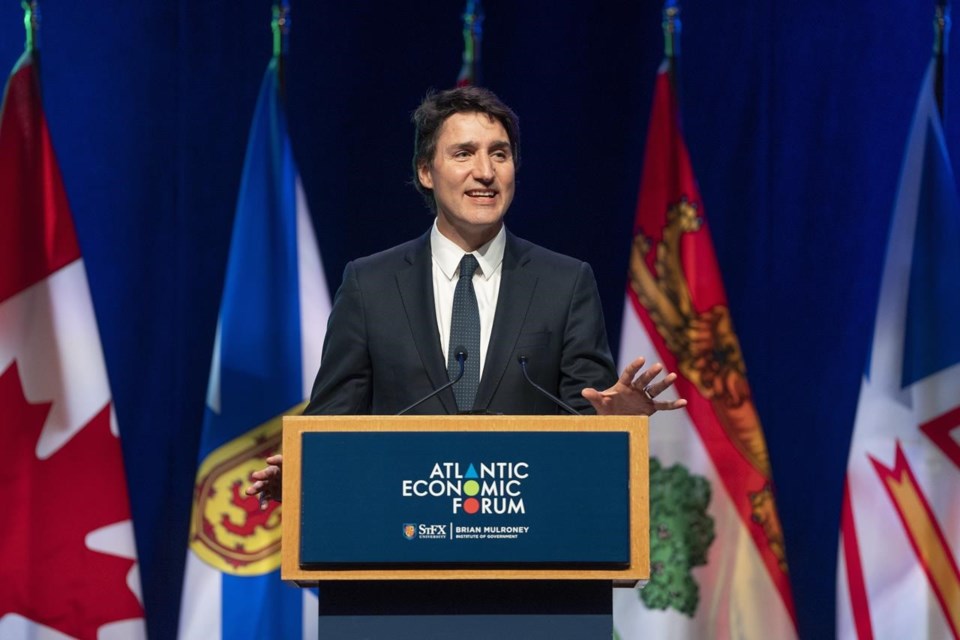ANTIGONISH, N.S. — Prime Minister Justin Trudeau said Monday he remains confident his government will eventually support a connected loop of Atlantic and Quebec electricity, allowing the Maritimes to end its reliance on coal.
But the promise was quickly criticized by Nova Scotia Premier Tim Houston, who said Ottawa hasn't put enough money into the idea to make it work.
During a speech to delegates at the Atlantic Economic Forum, Trudeau pointed to Volkswagen's decision to create an electric-vehicle battery plant in St. Thomas, Ont., saying the firm was attracted by the availability of low-carbon emission electricity.
"We want to see investment like this coming to Atlantic Canada, too. That's what our commitment to building the Atlantic Loop is all about," Trudeau told several hundred people gathered to discuss economic development at St. Francis Xavier University in Antigonish, N.S.
Trudeau was speaking after an introduction from former prime minister Brian Mulroney, who emphasized national leaders need to be capable of seeing the long-term impact of their policies.
Before the speech, the former Progressive Conservative leader gave the prime minister a tour of Mulroney Hall on the campus, showing him a replica of his centre-block desk. During their meeting, Trudeau recalled how Mulroney had established the Atlantic Canada Opportunities Agency in the 1980s in an effort to lift the region's struggling economy.
Trudeau said that creating a loop of hydro power bringing electricity from Quebec and Labrador into Nova Scotia, mainland Newfoundland and New Brunswick would become a similar investment in the region's economic prosperity.
"Just think of it, the East Coast should and could be a clean-energy powerhouse and this federal government will be there to help make it happen," said Trudeau.
"Not only is (the Atlantic Loop) the fastest and most cost efficient way to get off coal, it will also make sure the Atlantic region has power to meet growing electricity demands."
However, after meeting with Trudeau and hearing the speech, Houston responded that the federal Liberal government's offers aren't sufficient.
"I don't know where it lands but we'll have a discussion and we'll continue to exchange information ... but at the moment what the federal government is talking about, it's just not an economically feasible project for Nova Scotians," said the premier.
Documents released to The Canadian Press last week indicated Ottawa has ambitious goals to hammer out an Atlantic Loop agreement in principle this summer and complete the project by 2030.
The source, who communicated on the condition of anonymity because they were not authorized to speak publicly, said Ottawa has also offered to invest $4.5 billion to help the project along.Â
The documents show the energy project would involve two interprovincial power lines connecting power from Quebec and Newfoundland and Labrador to Nova Scotia and New Brunswick. The line between Quebec and New Brunswick is estimated to cost $6.1 billion, while the other would cost $700 million, according to the notes, which are dated last month.Â
Houston's office has said the federal proposal is for a long-term loan, and it would involve Nova Scotia's electricity ratepayers helping pay for infrastructure in Quebec.Â
"Nova Scotia ratepayers paying for new infrastructure to be built ... in another part of the country is just not something I'm interested in," the premier told reporters on Monday.
The prime minister also noted during his speech that climate-change issues are becoming a greater concern for the region's economy, noting the recent wildfires and the damage created by hurricane Fiona last fall.
Earlier in the day, Trudeau visited a fire station in Hammond Plains, just a few hundred metres from where a wildfire burned a few weeks ago, destroying 151 residences.
A “Nova Scotia Strong” flag waved on the roadside.
Trudeau met with dozens of volunteer and full-time firefighters, as well as the fire department’s management and union representation, posing for photos.
He then addressed the group, thanking them for stepping up for their community.
“I also thank you for all the things we don’t know about, the things you don’t tell your partners or families about," Trudeau added. "I know you are all going into very scary situations regularly, and Canadians rely on you so deeply for everything you do.”
He noted it’s been “a tough few years,” with more frequent extreme weather events due to climate change, the COVID-19 pandemic and “incidents of violence or loss," an apparent reference to the 2020 Nova Scotia mass shooting.
“You’ve always been there to step up in so many different ways, and you do it day in and day out,” he said.
-- With files from Marlo Glass in Halifax.
This report by The Canadian Press was first published June 19, 2023.
---
This story was produced with the financial assistance of the Meta and Canadian Press ߣÄĚÉçÇř Fellowship.
Michael Tutton, The Canadian Press




